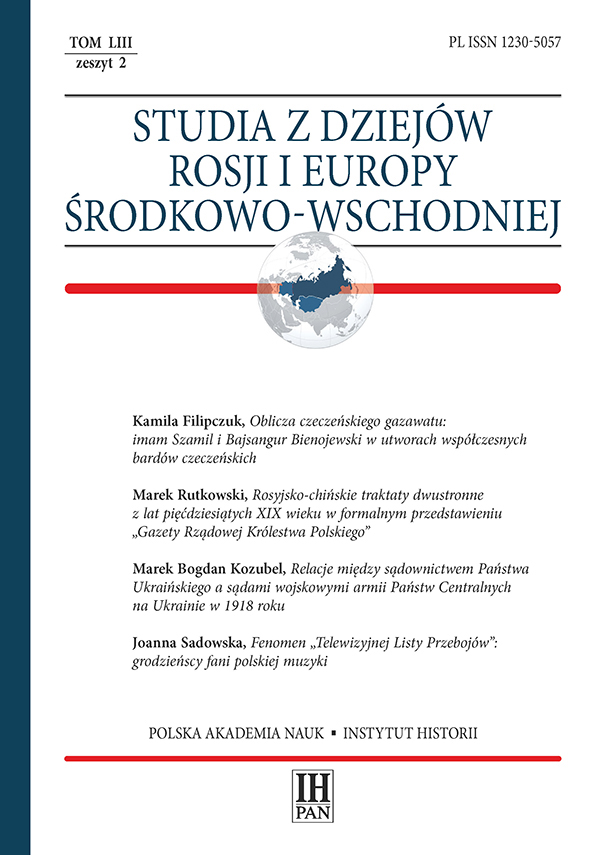Oblicza czeczeńskiego gazawatu: imam Szamil i Bajsangur Bienojewski w utworach współczesnych bardów czeczeńskich
The Faces of the Chechen Gazavat: Imam Shamil and Baysangur Benoevskiy in works by contemporary Chechen songwriters
Author(s): Kamila FilipczykSubject(s): History, Cultural history, Music, Oral history, Recent History (1900 till today)
Published by: Instytut Historii im. Tadeusza Manteuffla Polskiej Akademii Nauk
Keywords: Shamil’s uprising; Imam Alimsultanov; Timur Mutsuraev; war of national liberation; Chechnya; Gunib; chivalric ethos; sacred war; patriotism
Summary/Abstract: The article concerns two songs by contemporary Chechen bards – Imam Alimsultanov (1957– 1996) and Timur Mutsuraev (born 1976). The analysed works have the same title (Gunib) and present the conflict between Imam Shamil and Baysangur Benoevsky during the last stand of Shamil’s uprising against Russia – the siege of the mountain fortress Gunib. The two Chechen songwriters create a symbolic picture of two different attitudes towards honour, bravery, duty and self-sacrifice, represented by the characters of Shamil and Baysangur. The author of the article analyses the structure of the two songs and differences in constructing the narratives, that influence the interpretation of Shamil’s and Baysangur’s characters and their arguments. At first glance their attitudes are completely different. Shamil is motivated by pragmatism, whereas Baysangur seems to be the quintessence of unbroken resistance in the Romantic spirit and a perfect realisation of “quonahallah” – the specific Chechen “chivalric code”. The political context of Alimsultanov’s and Mutsuraev’s works (who were, first of all, composers of patriotic songs during the Chechen-Russian conflict in the 20th and 21st centuries) allows to believe that the attitudes of Shamil and Baysangur are somewhat complementary. Despite some controversy around Shamil, the leader of the 19th-century uprising has a place in the Chechen pantheon of national heroes, being the symbol of gazavat – the sacred national liberating war in the Caucasus. This conclusion is indicated not only by the message of the analysed songs and their context, but also by the opinions of contemporary Chechens cited in the article.
Journal: Studia z Dziejów Rosji i Europy Środkowo-Wschodniej
- Issue Year: 53/2018
- Issue No: 2
- Page Range: 37-56
- Page Count: 20
- Language: Polish

